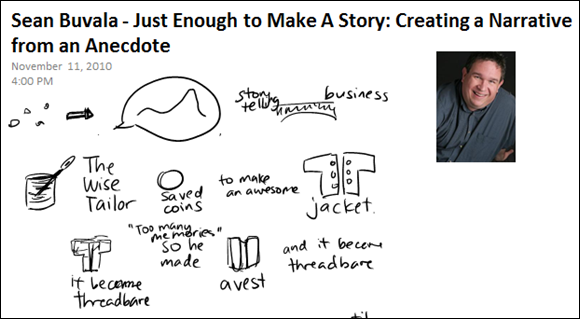Reinvention: virtual storytelling summit Nov 11 – 22, 2010
Posted: - Modified:Update: May 12 2012: Hmm, files are missing. Sorry!
UPDATE: Here are my sketchnotes from the first day. Click on each one to view the full-sized version. Want to share this post with others? Short URL: https://sachachua.com/blog/p/21866 . (Follow me on Twitter: @sachac)
New: Added three more sketchnotes:
That Resonates With Me! How to Change the World, One Story at a Time, Nancy Duarte
Shift Your Story Arc: Creating the Trajectory of Your Life, Julie Ann Turner
Screw Your Career Path, Live Your Story! Jason Seiden
Previously posted:
Why You Need to Tell a Bigger Story, Get Storied
Spend Shift: How the Post-Crisis Values Revolution is Changing the Way We Buy, Sell, and Live, John Gerzema
Just Enough to Make a Story: Creating a Narrative from an Anecdote, Sean Buvala
Social Movements as Participatory Storytelling, Andy Goodman and Lily McCombs
Want to share this post with others? Short URL: https://sachachua.com/blog/p/21866 . (Follow me on Twitter: @sachac)
—–
I normally gloss over marketing e-mails, particularly the ones that ask me to promote something to the readers of “sacha chua :: tech evangelist, storyteller, geek”. It was a good thing Anthony Marques reached out to me again about the Reinvention Summit, which turned out to be a virtual summit on storytelling with some pretty good speakers. The sessions will run from Nov 11 (today!) to Nov 22, and the basic Explorer's Pass is currently $33.33 – which you can get down to $8.33 if my math is right, using this $25 coupon code: REINVENTION. – the REINVENTION coupon doesn't seem to apply, but oh well! Not a bad price for attending sessions by Nancy Duarte, Steve Denning, and other storytelling gurus.
Of the 32 sessions planned, here are a few I'm particularly interested in:
Just Enough to Make A Story: Creating a Narrative from an Anecdote
Sean Buvala, Thu, November 11, 4pm – 5pm
In most business and nonprofit settings, there is plenty of anecdotal content for just about any point you would like to illustrate. However, these single-reference-point remnants of story need to be filled out and supported in order to make their biggest impact. In this workshop, you will learn some methods for helping you create impactful stories from these story-starters.
That Resonates with Me! How to Change the World One Presentation at a Time
Nancy Duarte, Thursday, November 18, 2pm – 3pm
If you say “I have an idea for something”, what you really mean is “I want to change the world in some way.” You might not be able to change the entire world, but what is “the world” anyway? It is simply all of the ideas of all our ancestors. Look around you. Your clothes, language, furniture, house, city, and nation all began as visions in other minds.
Humans love to create. And creating starts with an idea that can change the world.
“The only reason to give a speech is to change the world.” – John F. Kennedy
Presentations are the lingua franca of business and those who master communicating with them rise faster than their peers, reach more customers than their competitors, and turn causes into a groundswell.
Pioneering presentation innovator Nancy Duarte, CEO of Duarte Design, will demonstrate how to apply the methods in her book resonate: Presenting Visual Stories That Transform Audiences, to build meaningful connections with audiences that compel them to action. Her groundbreaking work details a new way of structuring a presentation and connecting with an audience – helping the presenter create a human connection.
Changing the world starts with transforming an audience and an audience will only change if you resonate with them.
In this session, you will learn to:
- Leverage the hidden story structures inherent in great communication
- Connect with your audience empathetically
- Create captivating content
- Craft ideas that get repeated
- Inspire enthusiasm and support for your vision
This session is for leaders who are tasked with communicating clearly and persuading through verbal communications.
Telling Taller Tales
Andrew Melville, Monday, November 15, 5pm – 6pm
I run through a model of three different levels of story; interesting, through memorable to compelling. I build on journalistic and script writing story principles to discuss people’s Intention behind storytelling, and look at observation, juxtaposition and transformation as components of powerful storytelling. I talk about experiences working with the Maori tribes of New Zealand, and their oral traditions, and metaphors from nature. Telling Taller Tales talks about building authentic and honest stories in the workplace, melding a brand story connecting marketing messages, vision and values and corridor conversations.
Why Great Storytelling Initiatives Fail, and What Can Be Done About It
Steve Denning, Friday, November 19, 4pm – 5pm
Why do great leadership storytelling initiatives tend to fail? These world-class initiatives in established organizations seem to flourish for a while, with strong top management support and demonstrated results; but then something happens, and the initiative is sidelined or downsized or undermined in some indirect fashion, Why do managers act in this way? Why don’t they recognize that storytelling is central to leadership and key to their organizations future? What can be done to sustain storytelling initiatives? Steve Denning draws on the findings from his new book, The Leader’s Guide to Radical Management, and shows what kind of changes are needed to have storytelling take its rightful place as a key management and leadership tool in 21st Century organizations. Come learn seven principles to enable storytelling in organizations.
-—
Even if Anthony didn't offer me a free press pass and discount coupon for sharing (code: REINVENTION), I'd probably pay for it anyway – it looks like it will be worth it. I might not have come across it without his nudging, though, so thanks, Anthony! =)
I'll post sketchnotes for the sessions I do manage to make it to. Check it out!







